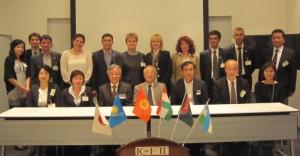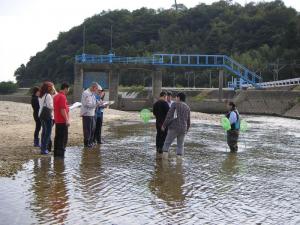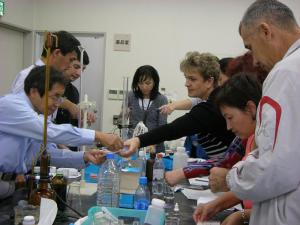Home > Workshop and Training > IN JAPAN > Fiscal Year 2011 > JICA Training Course in Progress on Water Quality Monitoring for Effective Usage of Water Resources in Central Asia
Main content starts here.
Update:November 22, 2011
FY2011 JICA Training Course in Progress on Water Quality Monitoring for Effective Usage of Water Resources in Central Asia
A fiscal 2011 JICA-commissioned training course on Water Quality Monitoring for Effective Usage of Water Resources in Central Asia kicked off on October 24. Ten participants came from Kazakhstan, Kyrgyz, Tajikistan, Turkmenistan, and Uzbekistan. They have been spending their busy days attending lectures, visiting related facilities and conducting practice work to learn about Japanese legal systems to conserve water quality and a series of water-quality monitoring methods.

The course has given the participants various opportunities to sample water in a river and spend an entire day analyzing water quality at a chemical laboratory owned by an organization that supports our training courses.


Beside the course work, we had many chances to talk with the participants. Some of the most impressive observations they described about Japan included: Their dreams came true when they, who had grown up in land-locked countries, finally saw the ocean for the first time in their lives in Japan. The Japanese working environment is so thoroughly mechanized that there are only small numbers of workers at factories. Japanese tap water actually tastes quite good. On the other hand, some surprising remarks about the situation in their own countries are that chemical testing work is mostly done by women in Central Asia, and staff responsible for chemical analysis, with their tasks regarded as dangerous, work shorter hours than clerical workers and are given milk in their workplace. Many more interesting stories are expected. (Minamikawa)







